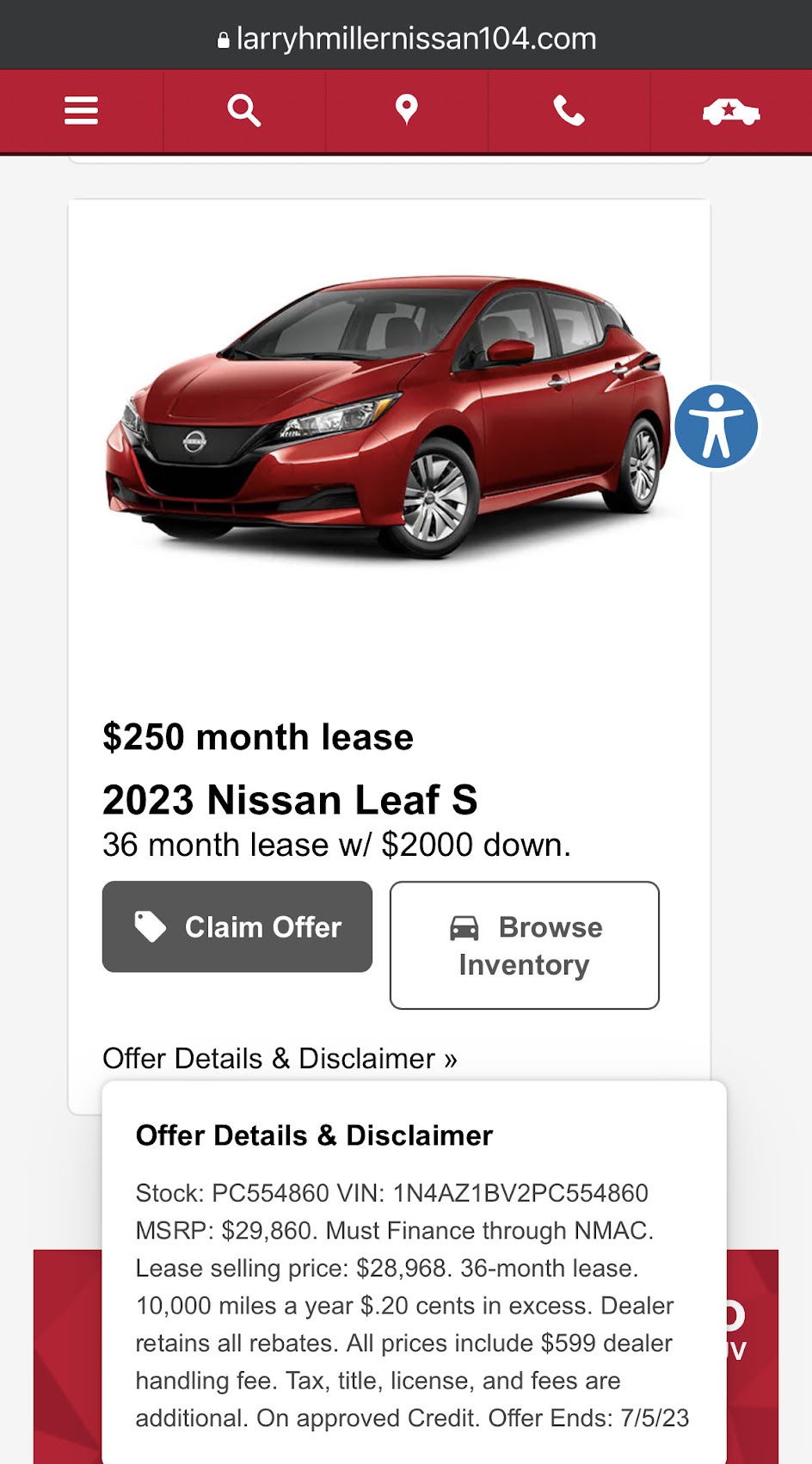
In this article, I go to 2 dealers and shop 3 brands so that you don’t have to. I know many people would rather have a root canal than visit a car dealer, but I actually enjoyed it (yeah, I’m weird like that). I was visiting my daughter in Denver this weekend and wanted to check out the story of some of the leading electric vehicles in the area. I would have visited Ford if I had had time, but I needed to run some other errands. The story I went in with (mostly true) is that I live in Florida and have a Tesla there, but I’m looking for a less expensive electric car for my daughter to use for commuting. So, I looked at entry level cars emphasizing that price is more important to me than range and fancy features.
Chevrolet Dealer
This article was going to be all about the Chevy Bolt, but for reasons which will become obvious in a few more words, I decided to expand it to include other brands. The Chevy Bolt fits the bill for people that don’t care about fancy features and either won’t use it for road trips or aren’t in a hurry on their longer trips. We at CleanTechnica have written a lot about the Bolt, including this review of a used Bolt 3 days ago by one of our best writers, Steve Hanley. I drove to a local Denver area Chevy dealer that proudly claims they don’t charge over MSRP. They said they were sold out of the Bolt and the Bolt EUV and had quit taking deposits since production was stopping this year. They did say that they had one cancellation due to personal circumstances and when it came in next week, it would go to the first person to put down a deposit. I asked about used Bolts and they said they sell as fast as they get them in. With the Bolt starting at $26,50o and eligible for both the $7,500 federal tax credit and the $5,000 Colorado tax credit today or $7,500 Colorado tax credit starting January 2024 (since its MSRP is less than $35,000), this would potentially let a brand new Chevy Bolt start at an astounding $11,500 next year or $14,000 right now after both credits. No wonder they are sold out! It’s too bad Chevy can’t allocate more cars from other regions to satisfy the demand. I was planning on recommending this car to some friends who I’ve made in Colorado, and actually I still will, but with the caveat that they would be very lucky to find one. So, I decided to check out some other dealers.
Nissan Dealer
I owned a Nissan Leaf for 6 years and found it a great city car. That being said, battery degradation was a big issue with the passively cooled battery and Nissan updated the styling but made less updates to the powertrain than the company needed to make in my opinion. The Nissan Leaf S with 149 miles of range starts at a reasonable $28,040, and the dealer had several in stock. This car is made in the US, so I thought it might qualify for some or all of the federal tax credit. I found out, however, that the pack comes from Japan, so it gets zero federal credit. The dealer offered a $2,000 discount and the local utility offers $1,000 off, and it does qualify for the $5,000 Colorado credit now or the $7,500 credit starting in January. That puts us at $8,000 off now, or $20,080 for a car with a lot less range than the Chevy Bolt but over $6,000 more money. No wonder they have 4 in stock! But then I remembered the lease hack and looked for Leaf lease deals. I found they had an offer for $250 a month for 36 months with only $2,000 due at signing, so they must be giving you back some of the $7,500 federal tax credit and the $1,500 Colorado lease credit (which might be going up to $5,000 on July 1st, but it is unclear). But since Nissan Leaf vehicles have not held their value very well historically, the lease is taking that into account also.

Tesla Website
I searched Tesla’s website for rear-wheel-drive Model 3 vehicles in the area. I found that, since it is quarter-end (Tesla typically gives some discounts on inventory cars at the end of each quarter if you take delivery in that quarter), they are offering $2,270 off on this base model, for a price of $38,970. It is unknown if that discount will be there on July 1st. (Assuming it does remain is a bit of a stretch — if you don’t believe that, add $2,270 to the price below.) After July 1st, in Colorado, that car would be eligible for the $7,500 federal tax credit, the $5,000 Colorado tax credit, and maybe the $1,000 utility credit, for a net price (not instant credit — you have to wait 9 months for the tax credits) of $25,470!
Conclusion
As you can see, there are some astounding deals available to Colorado buyers starting next week (after July 1st, 2023). For the 3 makes I checked out, they each meet a target market.
- If you can secure a Chevy Bolt and are comfortable with its limitations, it is probably the best deal. It should offer clean and reliable transportation at a very low cost for many years to come. And at 6.4 seconds to accelerate to 60 mph, it isn’t slow. With your net cost of $14,000 (in Colorado), your financing and depreciation costs are likely to be extremely low.
- The Nissan Leaf lease is also a very low cost. You get a lot less range and a lot less performance. It uses the CHAdeMO high-speed charging standard that likely to be harder and harder to find over time, now that everyone has moved to either CCS or, increasingly, to Tesla’s North American Charging Standard (aka Supercharging). But for people who just plan to use it around town and like the convenience of leasing, it might be a good choice. Think of it as a bridge to the future where we surely will have more affordable electric cars to choose from in 3 years.
- Of course, I’m partial to the Tesla Model 3, an amazing car than was unveiled over 7 years ago and is still more advanced than 95% of the competition, gas or electric. It’s not as dirt cheap as the other 2 electric cars mentioned here, but it is a safe choice and the total cost of ownership compares favorably to almost any gas car available.
If you want to take advantage of my Tesla referral link to get Reward Credits, here’s the code: https://ts.la/paul92237 — but as I have said before, if another owner helped you more, please use their link instead of mine. If you want to learn more about Tesla’s new referral program, Chris Boylan has written an excellent article on it. Disclosure: I am a shareholder in Tesla [TSLA], BYD [BYDDY], Nio [NIO], XPeng [XPEV], Hertz [HTZ], and several ARK ETFs. But I offer no investment advice of any sort here.
Sign up for daily news updates from CleanTechnica on email. Or follow us on Google News!
Have a tip for CleanTechnica, want to advertise, or want to suggest a guest for our CleanTech Talk podcast? Contact us here.
Former Tesla Battery Expert Leading Lyten Into New Lithium-Sulfur Battery Era — Podcast:
I don’t like paywalls. You don’t like paywalls. Who likes paywalls? Here at CleanTechnica, we implemented a limited paywall for a while, but it always felt wrong — and it was always tough to decide what we should put behind there. In theory, your most exclusive and best content goes behind a paywall. But then fewer people read it! We just don’t like paywalls, and so we’ve decided to ditch ours. Unfortunately, the media business is still a tough, cut-throat business with tiny margins. It’s a never-ending Olympic challenge to stay above water or even perhaps — gasp — grow. So …




